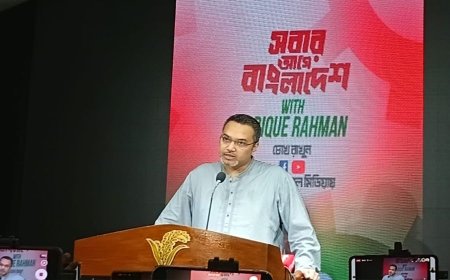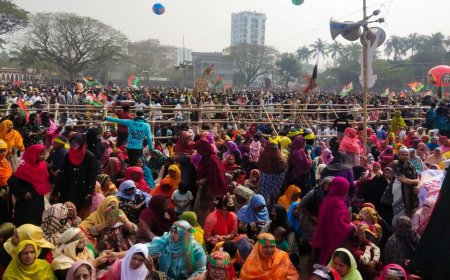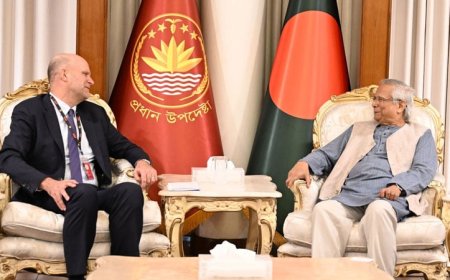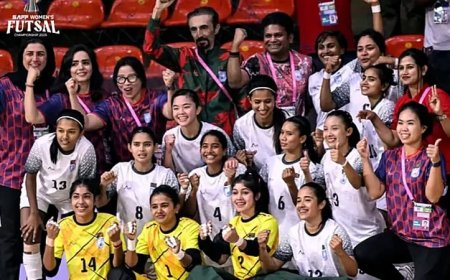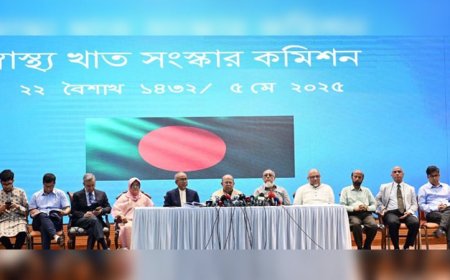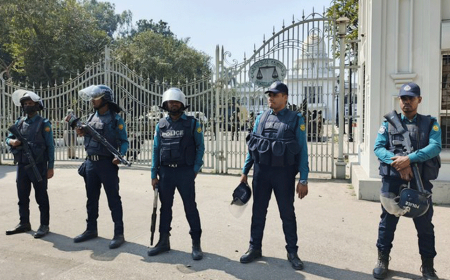The New Bangladesh is at risk. The Yunus government must cease yielding to Islamist extremists
The interim government led by Yunus cannot afford to fail as it implements political and institutional reforms to steer Bangladesh back toward democratic transition
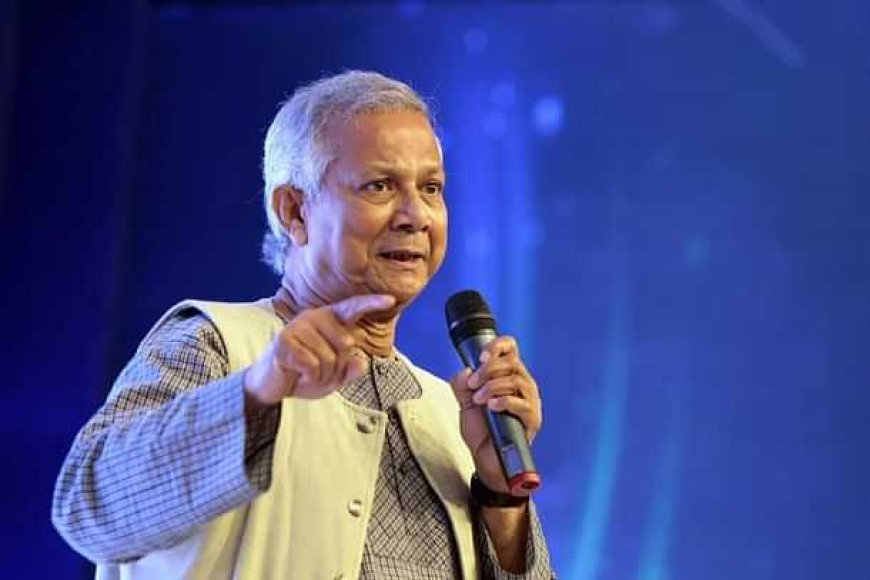
When the uprising in Bangladesh led to the replacement of Sheikh Hasina's government with the interim administration headed by Muhammad Yunus, it was expected to put an end to inequality, injustice, division, insecurity, and corruption. But how much of this vision has materialized? While it's understandable that such significant changes can't be achieved in just two months, can the government be trusted to build an inclusive Bangladesh?
The interim government has no room for failure as it implements political and institutional reforms to guide the nation back to democratic governance. It is essential to deliver justice to the 1,581 martyrs and over 19,000 individuals injured in the fight for a fair and just society. So, what is the current state of affairs?
Inability to Control Unrest
First, the interim government has largely struggled to manage social unrest, resulting in widespread dissatisfaction. In the aftermath of the uprising, Bangladesh has seen a series of mob lynchings, attacks on religious sites, arson, looting of industrial areas, and violent confrontations in the Chittagong Hill Tracts. Labor unrest in the garment industry has led global brands to shift their orders to India.
Although the government responded to a few incidents due to significant social media backlash, its overall presence has been alarmingly absent. Instead of taking decisive actions to address these issues, Yunus has chosen to avoid confrontation. In an interview with National Public Radio (NPR), he stated, "This is 15 years of your grievances. We cannot solve it in 15 days."
Even if these are longstanding grievances, should a government permit such violence to continue? Two months after the uprising, the government seems preoccupied with the shadow of Hasina rather than fulfilling its responsibilities. Supporters of the deposed leader can exploit this situation because of the interim government's lack of control. When asked about the attacks on minority communities, Yunus remarked, "People are in the mood for revolution ... They were killed. So they are looking for people who made their colleagues die." He implied that attacks on the followers of Hasina's party were to be expected because the minority community, especially Hindus, had ties to her.
How can the head of the government speak in such a dismissive manner? This condescending attitude won't resolve the issue; it may instead incite further violence.
Furthermore, the interim government's lack of confidence in handling situations has led to increased unrest. Various groups are taking advantage of this uncertainty, regularly pressuring the government to meet their demands. For example, on October 14, a group of students protested in Shahbagh, Dhaka, demanding swift approval for a proposal to raise the maximum age limit for public sector jobs.
Five days later, several hundred outsourcing workers from various government institutions blocked the Shahbagh intersection for about seven hours, demanding the nationalization of their jobs, which caused significant traffic disruptions.
Even if supporters of the ousted regime capitalize on the situation, it is primarily due to the interim government's failure to manage the crisis.
Elections, Extremism, Law & Order
Second, Yunus has not clarified the duration of his government. While the interim administration has yet to provide a definitive election roadmap for transitioning to an elected government, Army Chief General Waker-uz-Zaman indicated in an interview with Reuters that a transition to democracy should occur within 18 months. Such a statement should have originated from the government itself. This disconnection invites vested interests to exploit the situation.
In a recent interview with Voice of America (VoA) at the UN General Assembly, Yunus expressed confidence in determining the interim government's term. "When you hear it from us, that will be the actual date. The advisory council has discussed the term, but no decision has been made yet."
This approach is welcomed, as the public desires cooperation between the military and the government rather than the army acting as a parallel authority.
Interestingly, Law Adviser Asif Nazrul recently stated that national elections could be arranged next year following pre-election preparations, including forming a new Election Commission through a search committee. Just a day later, Religious Affairs Adviser AFM Khalid Hossain reiterated that elections would occur after state reforms aimed at ensuring stability, echoing the government's stance of "reform first." In response to comments from Nazrul and the army chief regarding the election timeline, the religious affairs adviser emphasized, "Those are not the official statements of the government. Prof. Yunus has said that when you hear it from the government, that’s when the election will happen."
This lack of clarity about the election timeline could lead to further complications for the government.
Third, the Yunus-led interim government has yet to demonstrate confidence in addressing radical Islamist groups. The uprising aimed to establish a fair and democratic society where everyone enjoys equal status. However, the government's confidence falters when confronted with radical elements.
For instance, when a radical group demanded the relocation of the Durga Puja venue—the largest festival for Bangladeshi Hindus—the Yunus administration’s home affairs adviser remained notably silent. Furthermore, the army, granted special powers by the government, moved the venue to a nearby ground after consulting locals, signaling to radicals that the government is willing to accommodate their demands.
In another incident, the interim government canceled the coordination committee responsible for revising textbooks under the National Curriculum and Textbook Board (NCTB) after some Islamists demanded the removal of two members they labeled as "anti-Islam." Ironically, these two members had been critical of Hasina’s government. Transparency International Bangladesh (TIB) has raised serious concerns, asserting that the government’s submission to radical threats sets a dangerous precedent. Such decisions encourage further demands from extremists, complicating the government’s ability to manage future challenges.
Recently, police arrested the media coordinator of the banned group Hizb ut-Tahrir and placed him on a three-day remand. Effectively dealing with extremist elements remains a significant challenge for the government. The demands from radicals act like symptoms of a deeper issue that need to be addressed through awareness and dialogue.
Fourth, the interim government appears to lack firm control over the country's law and order. Yunus noted that police morale has declined due to the previous government's use of law enforcement as a tool of repression against protesters. While this is a valid point, how long will it take to restore this morale?
In the meantime, the absence of effective law enforcement has led to an increase in moral policing and vigilante justice, with many incidents going unreported. In mid-September, videos surfaced showing men engaging in moral policing by attacking women with sticks in Cox’s Bazar, with police present but failing to intervene.
Due to the interim government's inaction and neglect since the uprising, such incidents have become more common, with perpetrators believing they can act with impunity. Additionally, the prices of essential goods continue to rise, exacerbated by the government's lack of initiative to address the crisis. Without providing relief or fostering public confidence, no reform initiatives can succeed. People need to feel that there is a government looking after their interests. Frustratingly, the Yunus-led administration has fallen short in this regard.
Overreliance on Students
Fifth, the government's excessive reliance on students will undermine the institutions it aims to reform. Environment, Forest, and Climate Change Adviser Syeda Rizwana Hasan recently announced a ban on polythene shopping bags, a positive step in a country grappling with pollution. However, it was concerning that she stated students would be responsible for monitoring this ban in superstores. Why are students tasked with this duty instead of government agencies? Are students now considered authorities? This approach resembles the previous Awami League government’s use of its student wing to serve its interests.
In the initial month after the uprising, students were also seen managing demonstrations involving Ansar members, the country’s largest community-based disciplined force, who were advocating for their demands. The government failed to handle the situation wisely and instead opted for the easy solution of unofficially inviting students to intervene. While Yunus credits students for fostering a new Bangladesh, excessive reliance on them could embolden them to assume authority, complicating the interim government’s tasks.
Yunus must earn the trust of all Bangladeshis, representing a nation with diverse ethnicities, religions, political beliefs, and ideologies. As a Nobel Peace Prize laureate, he should avoid rhetoric that promotes division instead of diversity and inclusion. He must demonstrate to the public that he represents everyone, not just a specific segment of society. Yunus needs to show that his government can thwart attempts to destabilize the nation and that he has confidence in its ability to implement political and institutional reforms while gaining support from various political factions.
The Yunus-led interim government must urgently provide the public with a sense of security by effectively addressing issues like mob justice, moral policing, anti-democratic radicals, and rising prices of essentials. If stability is achieved, the government can gradually tackle other challenges. However, failure to ensure social safety could lead to widespread chaos, posing a significant threat to Yunus and his administration.
What's Your Reaction?







